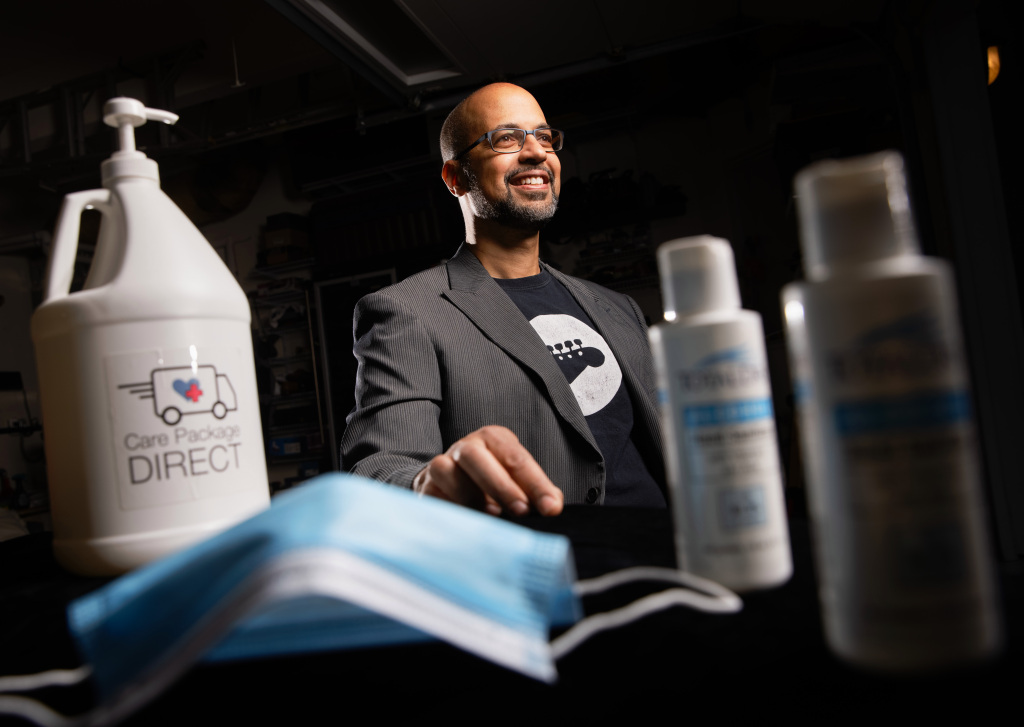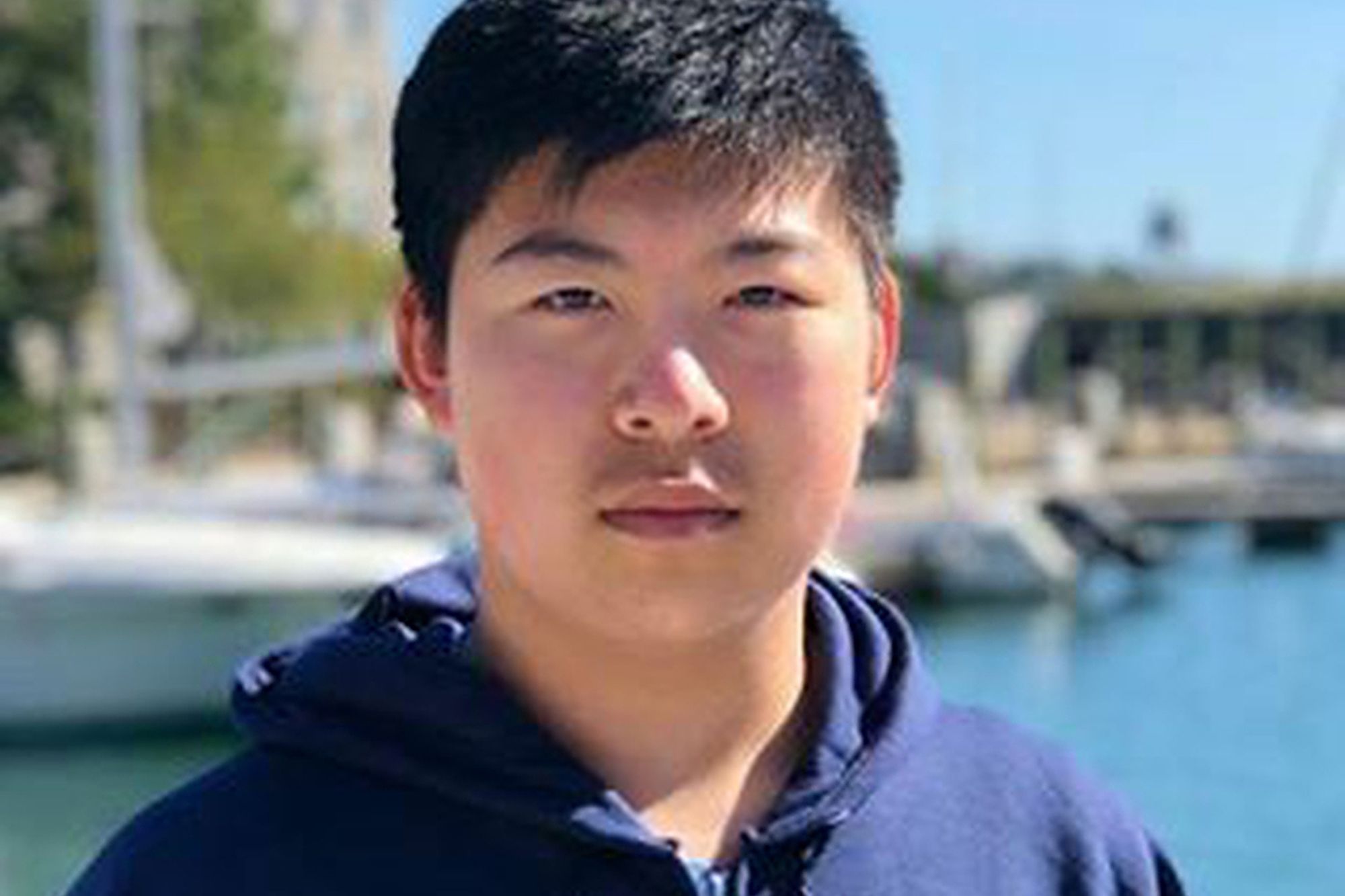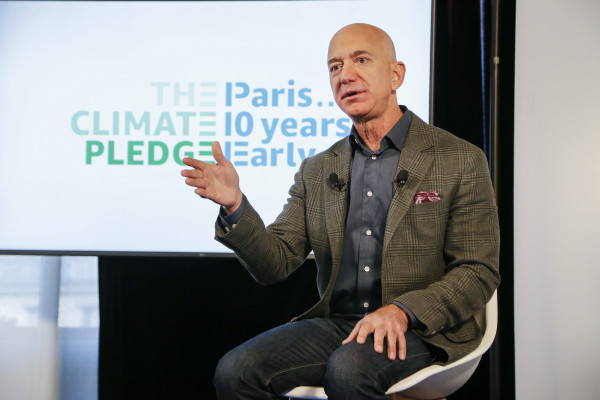As an unprecedented global pandemic spread to every corner of the U.S. last spring, it occurred to Joel Vincent that the ensuing free-for-all rush for supplies would yield some winners and a lot of losers.
Hospitals and other large institutions were placing bulk orders of personal protective equipment, including masks and sanitizer, to safeguard their workers from the new virus.
When small-business owners in the Bay Area — including some of Vincent’s friends — tried to stock up for their own operations, they found that manufacturers had no bandwidth or inventory left to deal with local family-owned restaurants and storefronts.
So Vincent, a marketing executive who previously specialized in finding supply-chain solutions for the tech industry, decided he would try to bridge the gap. The 45-year-old San Jose resident started Care Package Direct, a subscription-based service that provides regular PPE shipments to small businesses.
After months of finding new clients around the region, Care Package Direct is looking to expand to the rest of the country.
In an interview, Vincent described how his business-to-business service has taken shape in the trenches of the coronavirus’ war on the local economy.
Q: How soon into the pandemic did you start thinking about how PPE supply chains would affect businesses struggling to remain open?
A: It was almost right away. My friends who had small restaurants were trying to find PPE, but there was nothing of good quality around. So I said, ‘I know a guy!’ You started to see the gap pretty quickly.
The opportunity that we were already looking at was how small businesses are dealing with health and safety regulations in general. COVID really highlighted some serious problems, but even before that, I was always interested in businesses below a certain size in the Bay Area.
I have a lot of winery friends; one of my side hustles, if you will, was in 2008 or 2009, when I created a wine-to-social media conference (to connect small wineries to each other). At any rate, I was always interested in a supply chain, operational thing for businesses below a certain size. They have a billion things to think about; it was about automating things that bigger companies also have to worry about but without a human being.
COVID comes along and disrupts not only the supply chain, but the consequences of not keeping up with what you’re supposed to do — which include getting shut down. The problem was that businesses now have to go try to find these things when the state and Kaiser are trying to buy all of it, and you’re left literally with low-quality scraps. This was now an added burden that they really didn’t have before.
Q: How does your business model work?
A: We have some relationships with manufacturers (that also create elder-care equipment like catheters), so we realized we can pretty easily create PPE as a service. Technologically, it’s a fairly simple thing, but we were able to use our relationships to make sure the quality of the PPE is there.
So on the businesses’ side, they can get good quality products and make sure their supplies are replenished and not have to think about it. But the problem the supply side was having with small businesses is that manufacturers can’t overbuild (materials) and hope small business buy them.
But we have a predictable way to tell manufacturers three weeks, four weeks, even four months out, what the demand from small businesses is going to be. With these subscription orders, there’s now a predictable way for manufacturers to operate and still help out the little guys.
Q: Since the pandemic first started, there have been discussions about what kind of masks are most effective and how much physical surfaces play a role in spreading the virus. How do you navigate providing equipment as our understanding of COVID-19’s science evolves?
A: We really took our cues from what the normal behavior was in Asia. They dealt with SARS, bird flu and swine flu. It was very normal for them to walk around with masks even before COVID-19. They’d learned from previous epidemics and pandemics.
I always had a sense that people were going to come around to masks. I wasn’t going to get into the equivalent of religious wars over whether or not you should wear a mask. The science is what it is. I think I saw a picture of a football game during the 1918 flu: an old-timey, black-and-white picture, and there were guys in button-up vests and hats wearing masks. To me, it’s been a very strange argument and one I don’t engage in with anybody.
Different places have different requirements for how much they need. We started creating kits so people have a little bit of guidance. There is a way to buy a la carte, or you can just get kits if you don’t know where to start, and you’ll quickly figure out what you’re running out of, and then adjust.
Q: You said you began by helping out your friends who own small businesses. Since then, how have you gotten in touch — and stayed in touch — with new clients amid a cycle of reopenings and closures?
A: We communicate through the site and email, but I still call around regularly. It is rather chaotic and tense, so it’s best to literally reach out however you can.
Prior to trying to spread out nationally, we were really focused on the Bay Area. It wasn’t hard to find people, because businesses here are looking for masks. There are a lot of requests for gloves but we’re waiting until we have a supply of good quality gloves. Right now, there’s the nitrile gloves, but only doctors can get those.
But it is an ever-changing process. As we learn new things, we try to update the customs, especially as businesses are told to open, close, purple tier — it’s all kinds of stuff! We do the best we can.
Q: What’s something you’ve seen among businesses in the coronavirus era that you didn’t expect? And how will your business adapt as we head toward a future where the coronavirus (hopefully) isn’t a major problem any more?
A: I’ve noticed an evolution. It started out as, ‘We’re being told we need to reopen, I’ve got to have masks for our customers.’ Now, as we’re rounding the corner and people start to get vaccinated, I think the next phase is going to do with testing when it’s more rapid.
On the technology side, I have contacts with people who do testing. As people come back (to work), we think about safety measures you can take with employees. Bigger companies like Google offer, I think, weekly tests for employees.
When it comes down to a point where testing is simple and cheap enough, there’s a lot of interest in, ‘How do I as a small business make sure that people coming in are being tested?’ At least in California, people know they need masks — but now the questions are evolving to ongoing safety surveillance. It’s a good question; those are the things we’re looking at next.
Q: Health experts always warned of a winter surge, even as COVID-19 cases dipped in the warmer months. How have you navigated a COVID-focused business while the virus’ spread intensified and receded at different points?
A: For those kinds of things, I was just listening to Dr. (Anthony) Fauci and the (Centers for Disease Control and Prevention). I don’t know if you noticed, but if you look at him and his colleagues’ predictions about when surges were coming, the number of infections, the number of deaths — if you rewind the clock with a scorecard, they never missed.
All the way down to when they said the coronavirus was 10 times deadlier than the flu virus; we’re coming up on one year, the flu virus is 30,000 to 50,000 deaths a year, and now, unfortunately, the U.S. is going to have 400,000 to 500,000 dead from COVID-19.
With these things, you stick with what the science is saying. Their track record is pretty good at predicting surges. I think these guys are pretty smart, to be honest with you!
JOEL VINCENT’S PROFILE
Organization: Care Package Direct, LLC
Job: Founder, CEO
Age: 45
Birthplace: Long Island, New York
Residence: Willow Glen neighborhood, San Jose
Education: Bachelor’s, electrical engineering at Massachusetts Institute of Technology
FIVE THINGS ABOUT JOEL VINCENT
- Son of Haitian immigrants; father worked odd jobs in New York City (taxi driver, repairman for commuter rail) and served in the Army to put himself through college; father retired as an executive vice president of MasterCard.
- Played soccer from age 5 and fulfilled a bucket-list item in 2014 by traveling to see the World Cup in Brazil with his Brazilian brother-in-law.
- Plays bass guitar in his spare time.
- Met his wife a month before his 21st birthday and will celebrate 25 years of marriage in 2021.
- Daughter helped him formulate the idea of Care Package Direct because she wanted to help the Willow Glen small businesses through the pandemic.










